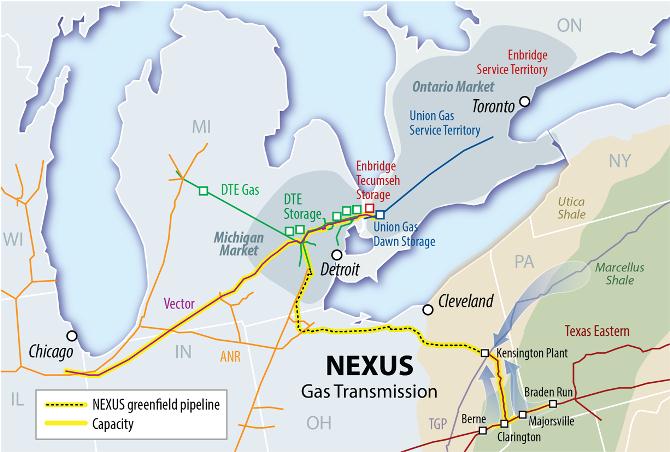
NEXUS is a proposed pipeline that will connect Michigan and Ohio with the Utica and Marcellus Shales to directly transport natural gas into these Midwest states. The development will cost $2 billion, which will be split by DTE and Spectra. The new pipeline will stretch 255 miles through Ohio and Michigan and connect with pre-existing infrastructure that DTE already owns. 87% of the proposed route goes through agricultural areas, limiting the number of households that will be affected. No construction can start until the Federal Energy Regulatory Committee (FERC) approves the proposal, however right of way acquisition surveys are being conducted to inquire about the residential land. The approval from FERC is expected to come in November 2016. If the project is approved in November, construction will begin in March of 2017 and will be completed and ready to operate in November 2017. Construction of the pipeline will require 47 miles total in Michigan, including 22 miles in Lenawee County.
The State of Michigan uses approximately three billion cubic feet of natural gas per day (Bcf/d). Michigan currently gets most of its natural gas from sources further west or south, which is generally more expensive to obtain. The new pipeline will transport gas from a much closer location while producing 1.5 Bcf/d, which will account for half of the average daily output for the state. The proposed pipeline will operate 24 hours a day and be monitored at all times. Regular inspections will be conducted by The Pipeline and Hazardous Materials Safety Administration (PHMSA) along with assessments conducted by NEXUS. Also, remote control emergency shut off valves will be installed at a minimum of every 25 miles, and more frequently in higher populated areas.
Due to the largest portion of the Michigan pipeline running through Lenawee, a positive economic output is expected. If approved, the development is expected to produce 569 new jobs in the county, which would total $28 million in labor income. For the state as a whole, it will bring over 1,500 new jobs and close to $100 million in labor income. Along with the new jobs and income, the pipeline will also make natural gas cheaper for the region. The project is estimated to procure $2.2 billion of savings to Michigan gas consumers within the first 15 years of activity.
If you would like to inquire further on the NEXUS Gas Transmission Project, feel free to contact Lenawee Now’s Tim Robinson or Jim Van Doren at (517)265-5141.
